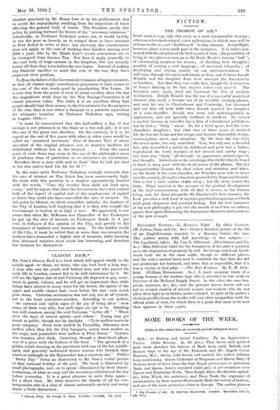FICTION.
THE PROMISE OF AIR.*
SOME readers may take this story as a mere irresponsible fantasy ; others as a foreshadowing of anew millennium, in which man will be at home in the air, and " find himself " in that element. Actual flight, however, plays a very small part in the narrative. It is rather con- cerned with the adoption of the bird's point of view—the possibility of being in two places at once, as in Sir Boyle Roche's famous " bull "; of substituting intuition for reason; of thinking bird thoughts ; possibly of coining a new language ; of universal telepathy ; of developing and relying mainly on our subconsciousness. It will come through favoured individuals at first, and of these Joseph Wimble and his daughter Joan were amongst the forertumers or forefliers. Not that they ever really flew, though the description of Joan's dancing in the last chapter comes very near it. The favoured ones, again, need not represent the 011ie of modern civilization. Joseph Wimble was the son of a successful analytical chemist who made a fortune out of an invisible sticking-plaster, and sent his son to Charterhouse and Cambridge, but disowned and cut him off with £500 when Joseph married the daughter of a corn-chandler. Joseph was stout and undistinguished in appearance, and not specially brilliant in intellect. He earned a modest income as traveller for a firm of educational publishers, but he had a " birdy " mind. So, for a brief space, had the corn- chandler's daughter ; but after two or three years of married life she lost her looks and her wings, and became thoroughly stodgy, commonplace, stout, and suburban. By the time she was forty she never spoke, but only mumbled. Torn, her only son, a dreadful boy, who resembled a rabbit in childhood and grew into a Yahoo, reproduced the worst features of her second and earthy stage ; but Joan was " birdy " all through—in appearance, gesture, speech, and thought. Indeed, she so far outstripped her father that ho found it hard to keep pace with her in all senses of the phrase. But her companionship became his chief solace and stimulus, and when, on the death of the corn-chandler, the Wimbles were able to move into the country,Joseph's education proceeded by leaps and bounds. This is but a bare outline of the story ; but the story counts for little. What matters is the account of the gradual development of the bird-consciousness, with all that it means, in the human being, and, for those who prefer Mr. Blackwood's later manner, the book provides a rich feast of mystico-psychicalimaginings, set forth with great eloquence and poetical feeling. But tho best summary of the new philosophy is put into the mouth of an h-less ex-railway guard, thus again illustrating the democratic character and incidence of the new evangel.


























 Previous page
Previous page